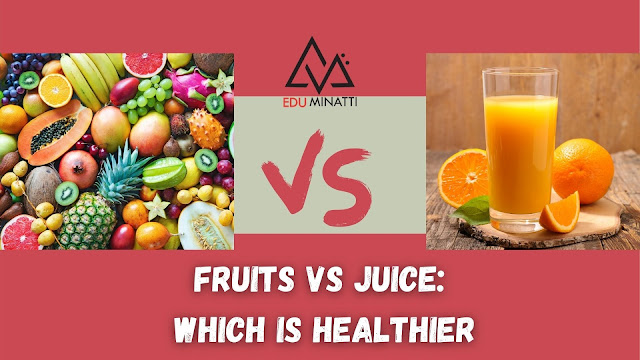Fruits VS Juice: Which Is Healthier?
We often stumble upon the question of whether fruit juice is healthier than the fruit itself. Well, no, fruit juice isn't more advantageous than entire fruit. Regardless of whether the juice is crushed on the spot, drinking the juice is less sound than eating the fruit. You might be enticed into believing that since natural fruit juice comes directly from the fruit, they should be healthfully equal. However, such reasoning isn't correct. There are two primary reasons explained by health experts of cbse schools in Delhi behind this inconsistency.
The pulp and skin of the fruit that is thrown are high in dietary fiber. Dietary fiber assumes a more significant part than simply advancing normal solid discharges. At the point when you eat a fruit, the dietary fiber in the pulp ties to the standard sugar in the fruit as it goes through your gastrointestinal parcel. This coupling activity makes it harder and takes more time for your body to assimilate the sugar. Therefore, the natural product's sugar amasses in your blood at a faster and slower rate on the off chance that you eat the fruit entirely than if you drink juice. This cycle lets your body utilize sugar more as an immediate vitality source. Interestingly, drinking straight natural product juice prompts a spike in glucose. Detecting that you have more sugar than you need, your body rapidly delivers insulin, producing a lot of the sugar in your blood to be changed to fat and glycogen.
Thus, the glucose spike prompts a glucose plunge (except if more food is eaten), leaving you hungry once more. Also, being eager causes you to eat more. Along these lines, drinking pure natural fruit juice prompts less fortunate glucose guidelines and expanded calorie utilization when contrasted with eating entire fruits. Individuals who are exceptionally touchy to glucose levels may even endure migraines, shortcoming, and crabbiness after drinking fruit juice, while these manifestations don't emerge when eating the fruit.
The pulp and skin of numerous fruits will, in general, be high in nutrients and different supplements. Extricating only the juice deserts quite a bit of this supplement. For example, oranges are a rich wellspring of flavonoids, yet a significant part of the flavonoids are put away in the pulp and not the juice.
The palatable skins of vast numbers of the World's Healthiest Fruits - including apples, apricots, blueberries, figs, grapes, pears, plums, prunes, raisins, raspberries, and strawberries - are for the most part destinations of significant natural action in the life of the organic product. The skin is one of the spots where the organic product communicates with daylight and structures an assortment of hued shades that assimilate various frequencies of light. These shades, including carotenoids and flavonoids, are very much investigated as supplements that ensure our wellbeing and sustenance. The skins of entirely natural products like grapes have been read for their capacity to assist lower with gambling of malignancy and help give assurance from bright light.
Sadly, when fruits are squeezed, we don't generally get the chance to appreciate the fruit's skin. That is because numerous squeezing measures eliminate the skin and don't consider its full advantages to get into the juice.
On the other hand, health experts of schools in Delhi believe that the additional advantage of juices is that, though it is deprived of some nutrients from the fruits, it is still very rich in nutrients when compared to normal food. The amount of sugar present in fruit juice helps in easy hydration of the body and instant energy supply to the body. Also, when people are not allowed to eat solid food, resorting to a liquid diet in the form of juices is very beneficial for the body.
Thus both have their own benefits, but, all in all, fruits are more nutritional than fruit juices.




Comments
Post a Comment